Movies and TV
“Lucy” : A Movie About Luciferian Philosophy
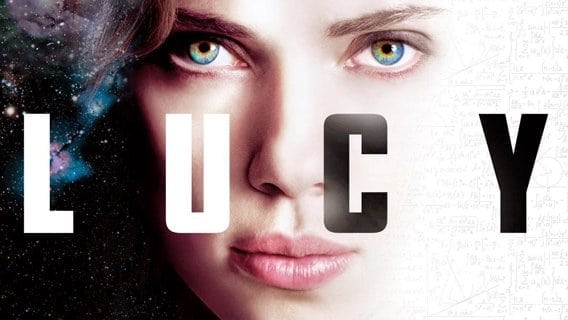
Luc Besson’s Lucy is a movie about a woman who unlocked the full, 100% potential of her brain power instead of the 10% humans reportedly use. While many viewers were confused by the movie’s odd mix of pseudo-science and action scenes, the core of the movie lies in a whole other realm: It is about the Luciferian philosophy of the occult elite and its futuristic pendant, transhumanism.
Warning: Gigantic spoilers ahead
Lucy is a science fiction movie that combines profound existential questions with a bunch of action scenes involving Asian gangsters. While this dichotomy wasn’t well-received by critics, there is an esoteric message hiding behind it all. Lucy is indeed more than a movie in which Scarlett Johanson being a “bad-ass” – it is an allegorical tale celebrating the philosophy of the elite: Luciferianism.
The fact that the main character is named Lucy is the first clue hinting towards the philosophical basis of the movie. The name Lucy and Lucifer both derive from the Latin word “lux” which means “light”. Lucifer means “light-bringer” in Latin, and is considered by Luciferians to have brought divine knowledge (light) to humans after being cast out of heaven by God. In Luciferian circles, Lucifer is perceived as a “savior” who gave humans the knowledge necessary to ascend to divinity. In the movie, Lucy is a human version of Lucifer, as her increased brain capacity allows her to gain the knowledge required to become a god.
Going further than ancient Biblical tales, the movie is also labeled “transhumanist”, which is a modern, futuristic byproduct of Luciferian thought. Transhumanism is about humans reaching another level of development through man-made technology and robotics. To fully understand Lucy, we will need to look further into these two concepts.
Luciferianism and Transhumanism
“Luciferianism” is a word that is rarely used because the word “Lucifer” is associated with Satan in Judeo-Christian theology. It is nevertheless the philosophy that overwhelmingly prevails in the highest circles of society – what we call the occult elite. Interpreted in several forms, Luciferianism can be associated with philosophical currents such as humanism, Gnosticism, and Kabbalism and is the driving force behind secret societies such as the Rosicrucians, the Freemasons, and many others.
Luciferianism is about humans reaching divinity through human means. This philosophy is symbolically represented by two mythical figures who bear similar characteristics: Prometheus and Lucifer. Both of these figures are considered by some circles to be benefactors of humanity as they brought fire and light (representing divine knowledge) to struggling humans. They gave mankind the means to become gods themselves, through their own means.
From this perspective, Luciferians interpret Biblical tales from a unique vantage point. In Genesis, Luciferians consider the snake who gave Eve the forbidden apple to be a hero, as he is the one who brought humanity knowledge of good, evil and everything in between. The story of the tower of Babel, a human construction meant to reach God in the sky is viewed favorably by Luciferians as it represents humanity’s struggle to reach divinity; the building of this immense tower was, however, stopped by God who is perceived as a jealous demiurge who trapped humans in the physical world.
In the 20th century, a high-tech version of this philosophy appeared as transhumanism, a movement that seeks the use of science and robotics to push humanity to another stage of development. Transhumanism’s admitted ultimate goal is the total merging of humans and robots. While most people who agree with transhumanism probably do not know much about Luciferianism, one of its “founding fathers” clearly sees the connection.
The British philosopher Max More first articulated the principles of transhumanism as a futurist philosophy in 1990 and started a worldwide intelligencia to promote it. One of his essays, entitled “In Praise of the Devil” goes deep in a theological territory to connect transhumanism with Luciferianism.
The Devil—Lucifer—is a force for good (where I define ‘good’ simply as that which I value, not wanting to imply any universal validity or necessity to the orientation). ‘Lucifer’ means ‘light-bringer’ and this should begin to clue us in to his symbolic importance. The story is that God threw Lucifer out of Heaven because Lucifer had started to question God and was spreading dissension among the angels. We must remember that this story is told from the point of view of the Godists (if I may coin a term) and not from that of the Luciferians (I will use this term to distinguish us from the official Satanists with whom I have fundamental differences). The truth may just as easily be that Lucifer resigned from heaven.
According to More, Lucifer probably exiled himself out of moral outrage towards the oppressive demiurge Jehovah. He, therefore, describes the basis of Luciferian thought:
God, being the well-documented sadist that he is, no doubt wanted to keep Lucifer around so that he could punish him and try to get him back under his (God’s) power. Probably what really happened was that Lucifer came to hate God’s kingdom, his sadism, his demand for slavish conformity and obedience, his psychotic rage at any display of independent thinking and behavior. Lucifer realized that he could never fully think for himself and could certainly not act on his independent thinking so long as he was under God’s control. Therefore he left Heaven, that terrible spiritual-State ruled by the cosmic sadist Jehovah, and was accompanied by some of the angels who had had enough courage to question God’s authority and his value-perspective.
What does this all have to do with Lucy? Well, Lucy is about everything above. It is about humanity reaching divinity through knowledge, about using science and technology to break “biological barriers”.
Although all of this might sound positive, there is a troubling, dark side to it all: Only a select few can be “illuminated” by the light of Lucifer. The rest of humanity is perceived as a lesser race with lives of no value. For this reason, Lucy remorselessly kills a bunch of people, including many innocents. This is what Luciferian thought is truly about.
Lucy as a Regular, Everyday Idiot
At the beginning of the movie, Lucy is a young woman who is clearly not a genius. She is manipulated by the douchebag she is dating to bring a suitcase to some person inside a hotel. She ends up getting mixed up in a high-stakes Asian mob deal – and she’s confused and panicky the entire time.

The first scenes of the movie are intercut with footage of a cheetah hunting a prey. This is a rather heavy-handed way of telling us that regular, un-illuminated humans act like animals in the jungle.

As she gets roughed up by the mobsters, Lucy wears a feline-print vest which tells us that Lucy is a regular, animalistic human who has yet to reach a higher level of evolution.
The mobsters end up turning Lucy into a drug mule. They insert into her body a packet of CPH4, a synthetic drug that is about to flood the European market. After receiving a kick in the stomach, the packet located inside Lucy breaks and her body absorbs the contents of the entire packet. This causes her brain to become increasingly powerful.
At one point, a doctor tells Lucy:
“Pregnant women manufacture CPH4 in the sixth week of pregnancy in tiny quantities. For a baby, it packs the power of an atomic bomb. It’s what gives the fetus the necessary energy to form the bones in its body. I heard they tried to make a synthetic version of it.”
In the philosophical context of the movie, the fact that the drug is synthetic (which means that it was created by humans), is important as it ties in with the transhumanist philosophy of human evolution through science and technology.
Is there any scientific truth to Luc Besson’s premise? Here’s a part of an interview with Besson discussing the science behind Lucy.
Q: Some people are complaining about the fact that the science behind your film — the whole idea that humans only use 10 percent of their brains — is not true. What’s your response to that?
A: It’s totally not true. Do they think that I don’t know this? I worked on this thing for nine years and they think that I don’t know it’s not true? Of course I know it’s not true! But, you know, there are lots of facts in the film that are totally right. The CPH4, even if it’s not the real name — because I want to hide the real name — this molecule exists and is carried by the woman at six weeks of pregnancy.
While the scientific facts behind the movie are nebulous, the symbolic meaning of it all is not. While Lucy is in the process of transforming into a transhuman superhero, Professor Norman (played by Morgan Freeman) gives a presentation about the untapped power of the human brain. His speech quickly turns into an advertisement for transhumanism.
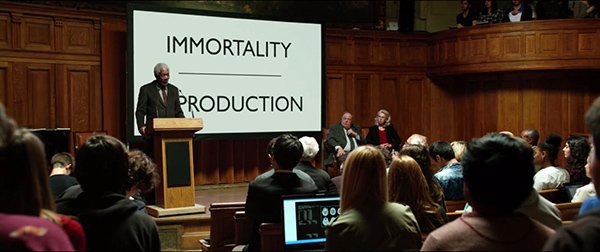
Dr. Norman explains that the only aim of simple cells is to make the knowledge they’ve acquired go through time. The only ways to accomplish that is to either become immortal or to reproduce … Lucy did not reproduce.
Professor Norman then says something that comes straight from a pamphlet for transhumanism :
“It’s up to us to push the rules and laws and go from evolution to revolution”.
In other words, humans need to reach another stage through technological and scientific advancement, not through natural evolution.
This is exactly what happens to Lucy. Along with acquiring a great amount of knowledge, Lucy develops extra-sensory perception (ESP) and is even able to control matter and other people. But one thing is terribly wrong: As soon as Lucy becomes smarter, she starts shooting and killing people. Why?
Luciferian Lucy: A Representative of the Occult Elite
Someone once said: “It is not about how much knowledge you have, it is about what you do with it”. What did Lucy do when she became the most intelligent person on Earth? Did she cure cancer? Did she find a solution to world hunger? Did she invent an economic system that is fair and profitable for all countries on Earth? Nope. She grabbed a gun a started shooting Asian guys. Even worse, she goes on to cause pain and suffering of innocent people.

As soon as Lucy breaks out from her cell, she kills everybody in the vicinity. Is remorselessly killing people a sign of advanced intelligence?
While killing those involved with her capture is somewhat understandable (although she probably did not need to kill everybody), the bloodshed does not end there. When she goes outside, she shoots a taxi driver in the leg because he did not immediately comply with her request. Later in the movie, Lucy drives like a crazy person and causes a ten-car pileup.
The pain Lucy causes is also psychological. When a doctor asks Lucy to prove her powers, she “enters” his brain and reminds him of the death of his daughter in specific detail. She could have told him about the color of his car, but why do that when you can talk about the most painful memory imaginable?
Lucy’s transformation takes a very specific direction and being a “good person” is not part of it. Her metamorphosis caused her to completely lack moral values, compassion, and consideration for other human beings. Apparently, being extremely intelligent turns you into an evil transhuman robot. Lucy herself says:
“I don’t feel pain, fear, desire. It’s like all things that make us human are fading away. It’s like the less human I feel, all this knowledge about everything, quantum physics, applied mathematics, the infinite capacity of a cell’s nucleus. They’re all exploding inside my brain, all this knowledge.”
If one examines Lucy’s evolution, one realizes that she turns into exactly what the occult elite represents. She uses her powers to control people and to advance her aims despite the human suffering she is causing. She morphed into something that is not human and, all of a sudden, regular humans are treated by Lucy as lesser beings that are idiotic, manipulable and expandable.
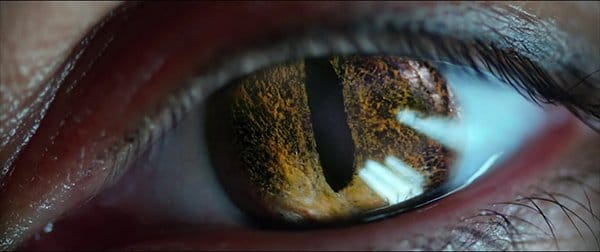
Throughout Lucy’s transformation, we see close-ups of her eyes which keeps changing forms (sometimes appearing reptilian) which emphasizes the fact that she is not human anymore.

Lucy also has no trouble using sex (one of the humans’ animalistic weaknesses) to get what she wants.
Also, like the occult elite, she spends a LOT of time controlling and monitoring people’s electronic devices.

Not unlike the NSA, a creation of the elite to control the flow of information across the world, Lucy can easily take control of electronic devices.

Of course, like the elite, she can appear on television. Interestingly enough, the television in Dr. Norman’s hotel room is a Samsung. A recent news story revealed that Samsung Smart TVs can listen to your conversations (even when they’re off) and send the information collected to a “third party” (which can easily be the NSA).
Like the occult elite, Lucy is not on a pure, noble mission for illumination. There is a dark side to her actions, and, apparently, since she’s the hero of the movie, it’s all good.
Lucy Ascends to Divinity
Towards the end of the movie, Lucy is less a human being than a divine being who sacrifices her terrestrial life to becoming nothing less than a god (I don’t use the term goddess because gods are neither male nor female). Lucy’s meeting with Dr. Norman at La Sorbonne University turns into a strange, high-tech, occult ritual where she transcends space and time to achieve divinity. During the entire ritual, lowly, idiot humans kill each other nearby in a flurry of gunshots.
The ultimate goal of Lucy’s transcendence is to pass on the knowledge she obtained, the same way two simple cells pass on their knowledge through time. However, according to Dr. Norman, this knowledge might be too powerful for mankind.
“But all this knowledge, Lucy. I’m not even sure mankind is ready for it. We’re so driven by power and profit. Given man’s nature, it might bring us only instability and chaos (…). I just hope we’ll be worthy of your sacrifice”.
This is the thinking behind secret societies who “hide” their occult knowledge from the uninitiated behind several layers of symbolism (occult literally means “hidden”). The profane masses are considered too unworthy and primitive to deal with powerful knowledge. In short, Luciferians are extremely elitist.

As Lucy transforms, she emits a great burst of light. As stated above, Lucifer means “light-bringer”.

Lucy gradually turns into a big, black mass of crappy CGI and uses it to create a super-mega-computer to store her knowledge. Lucy sits in the middle of a ritualistic pentagram to give the process an occult undertone.
Before completing her transformation, Lucy uses her powers to travel through space and time in order to visit various landmarks around the world. She ends up face to face with Lucy, ” the first human on Earth”.
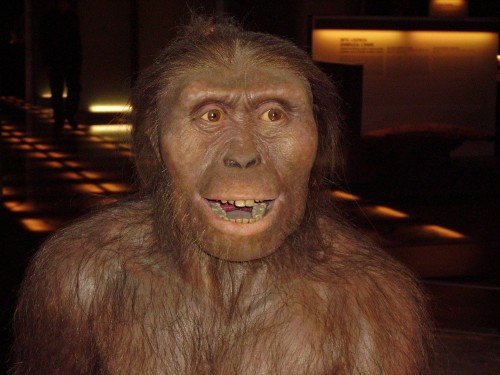
Discovered in 1974 in Ethiopia, Lucy is the name given to the remains of the “first human on Earth” – a never-seen-before species called Australopithecus afarensis. It is considered by scientists to be a “missing link” between animals and humans.
In a symbolic gesture, Lucy points her finger towards the other Lucy.

Lucy goes back a few million years in the past to meet Lucy the half-monkey. We, therefore, witness a Luciferian version of the Genesis, where Lucifer gives the “divine spark” to Lucy the half-monkey which will ultimately separate humans from animals.
The scene is, of course, a heavy-handed reference to Michelangelo’s mural where God creates Adam. The painting is also briefly shown earlier in the movie when Dr. Norman talks about humanity’s amazing accomplishments despite only using 10% of its brainpower.
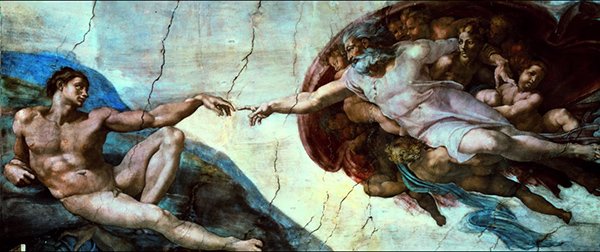
Michaelangelo’s mural depicts God giving life to Adam, the first man on Earth. The scene with the two Lucy’s provides a “higher-intelligence”, Luciferian version of Creation.
But today’s humans are still stuck at 10% brain power and still act like morons. While Lucy transcends space and time, a whole bunch of people die a few feet from her.

This is not simply a “cool action scene”. It is a way of communicating the Luciferian elite’s beliefs: “Non-Illuminated” humans are idiots and deserve to die.”
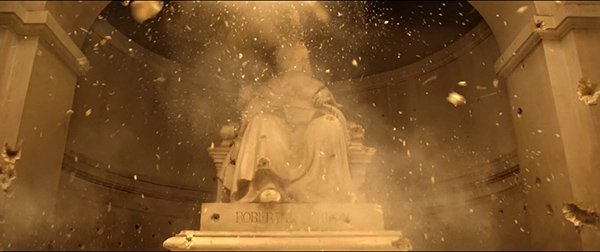
During the relentless fire between cops and mobsters, a statue of Robert de Sorbon – the founder of the University is destroyed – symbolically representing ignorant humans destroying knowledge.
After the ritual turning Lucy into an immortal god, she gives Dr. Norman a USB stick containing all of her knowledge, which is pretty convenient.
When a cop barges into the room and asks where is Lucy, he receives a text message that sums up the entire movie.

Lucy has become an omniscient being who is everywhere at all times. She acquired the qualities of a god. Like a true Luciferian, she achieved god status through knowledge.
The cop then looks towards the sky in admiration, the same way people usually look towards the heavens when thinking of God.
The movie ends with another symbolic scene: The lifeless body of a mobster seen from above as if it was Lucy overlooking the blood sacrifice that was required to complete the occult ritual.
In Conclusion
Lucy was bashed by critics for being somewhat nonsensical – but being “sensical” was not the point of this movie. It is a treatise on Luciferian philosophy, and it can only be fully “appreciated” by those who understand this philosophy. For those who don’t, well, there’s a bunch of action scenes peppered throughout to keep them entertained. Meanwhile, they absorb the occult meaning of the movie without even realizing what’s happening. These action scenes were meant to be in sharp contrast with Lucy’s quest for knowledge because Luciferians perceive a sharp contrast between them and the masses. While Lucy’s busy achieving immortality and turning into a god, a bunch of clueless guys kill each other for no good reason. And nobody cares. Because their lives are considered worthless.
Therefore, beyond the nonsensical premise of Lucy, there is a very “sensical” message, one that is as powerful as it is disturbing: There are two classes of humans on Earth and transhumanism will widen the gap between them. Most of the projects involving transhumanism have been described by observers as “playing God”. But this is not simply an expression: It is exactly what Luciferians are about.
- Hmm 🤔
- Donald Trump attends WEF conference in Davos (January 2020)
- 100% Proof Our Government is Hiding Nephilim Bodies & Are Trying to Bring Back Nimrod/Gilgamesh. Could Nimrod be the Beast of Revelation 17:8-11?
- Tesla's Elon Musk: We're 'Summoning the Demon' with Artificial Intelligence
- Lindsay Mills : Are you aware of occult symbolism in Her pictures..?!?
- LA Fire Attack Map is identical to the LA Smart City Rail Map
- Birds of a feather flock together …
Get an e-mail notification as soon as a new article is published on The Vigilant Citizen.
-

 Movies and TV2 months ago
Movies and TV2 months agoAdrenochrome and Ritual Humiliation: The True Meaning of the Movie “The Substance”
-

 Latest News3 months ago
Latest News3 months agoKamala’s Campaign Was Objectively the Worst in Recent History
-
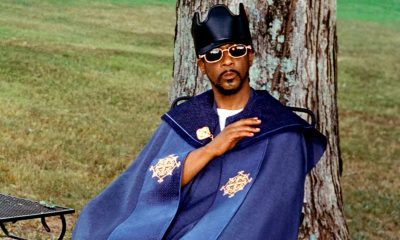
 Pics of the Month2 months ago
Pics of the Month2 months agoSymbolic Pics of the Month 12/24
-

 Latest News2 months ago
Latest News2 months agoWas the Jake Paul vs Mike Tyson Fight a Humiliation Ritual?
-

 Latest News3 months ago
Latest News3 months agoAn “Urban Opera” in Toulouse Using Massive Machines is Denounced as a Satanic Ritual
-

 Movies and TV1 month ago
Movies and TV1 month agoThe Hidden Meaning of “Smile 2”: It’s About Monarch Mind Control
-

 Latest News1 month ago
Latest News1 month agoIt Was Bound to Happen: Jay-Z Accused of Abusing a 13-Year-Old Girl
-

 Latest News1 month ago
Latest News1 month agoReturn of the Pendulum: My 2024 Holiday Message


















